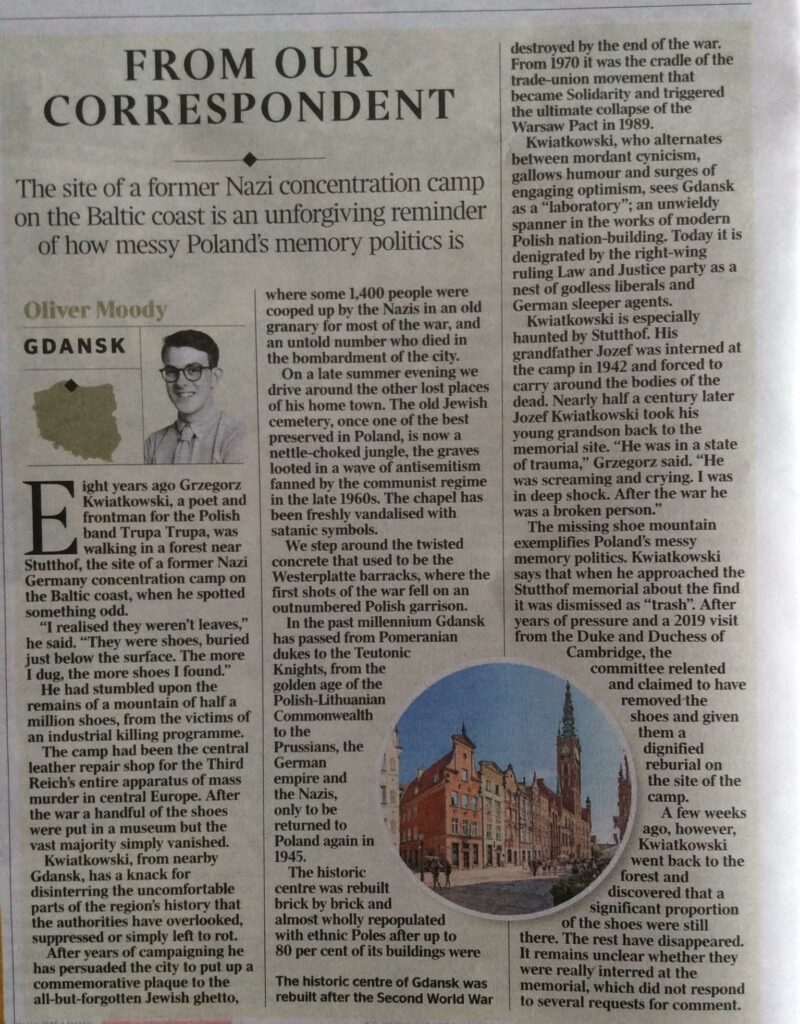The land that can’t forget its mountain of Holocaust shoes. The site of a former Nazi concentration camp on the Baltic coast is an unforgiving reminder of how messy Poland’s memory politics is.
Eight years ago Grzegorz Kwiatkowski, a poet and frontman for the Polish band Trupa Trupa, was walking in a forest near Stutthof, the site of a former Nazi Germany concentration camp on the Baltic coast, when he spotted something odd. “I realised they weren’t leaves,” he said. “They were shoes, buried just below the surface. The more I dug, the more shoes I found.” He had stumbled upon the remains of a mountain of half a million shoes, from the victims of an industrial killing programme. The camp had been the central leather repair shop for the Third Reich’s entire apparatus of mass murder in central Europe. After the war a handful of the shoes were put in a museum but the vast majority simply vanished. Kwiatkowski, from nearby Gdansk, has a knack for disinterring the uncomfortable parts of the region’s history that the authorities have overlooked, suppressed or simply left to rot. After years of campaigning he has persuaded the city to put up a commemorative plaque to the all-but-forgotten Jewish ghetto, where some 1,400 people were cooped up by the Nazis in an old granary for most of the war, and an untold number who died in the bombardment of the city. On a late summer evening we drive around the other lost places of his home town. The old Jewish cemetery, once one of the best preserved in Poland, is now a nettle-choked jungle, the graves looted in a wave of antisemitism fanned by the communist regime in the late 1960s. The chapel has been freshly vandalised with satanic symbols. We step around the twisted concrete that used to be the Westerplatte barracks, where the first shots of the war fell on an outnumbered Polish garrison. In the past millennium Gdansk has passed from Pomeranian dukes to the Teutonic Knights, from the golden age of the Polish-Lithuanian Commonwealth to the Prussians, the German empire and the Nazis, only to be returned to Poland again in 1945. The historic centre was rebuilt brick by brick and almost wholly repopulated with ethnic Poles after up to 80 per cent of its buildings were destroyed by the end of the war. From 1970 it was the cradle of the trade-union movement that became Solidarity and triggered the ultimate collapse of the Warsaw Pact in 1989. Kwiatkowski, who alternates between mordant cynicism, gallows humour and surges of engaging optimism, sees Gdansk as a “laboratory”; an unwieldy spanner in the works of modern Polish nation-building. Today it is denigrated by the right-wing ruling Law and Justice party as a nest of godless liberals and German sleeper agents. Kwiatkowski is especially haunted by Stutthof. His grandfather Jozef was interned at the camp in 1942 and forced to carry around the bodies of the dead. Nearly half a century later Jozef Kwiatkowski took his young grandson back to the memorial site. “He was in a state of trauma,” Grzegorz said. “He was screaming and crying. I was in deep shock. After the war he was a broken person.” The missing shoe mountain exemplifies Poland’s messy memory politics. Kwiatkowski says that when he approached the Stutthof memorial about the find it was dismissed as “trash”. After years of pressure and a 2019 visit from the Duke and Duchess of Cambridge, the committee relented and claimed to have removed the shoes and given them a dignified reburial on the site of the camp. A few weeks ago, however, Kwiatkowski went back to the forest and discovered that a significant proportion of the shoes were still there. The rest have disappeared. It remains unclear whether they were really interred at the memorial, which did not respond to several requests for comment.


